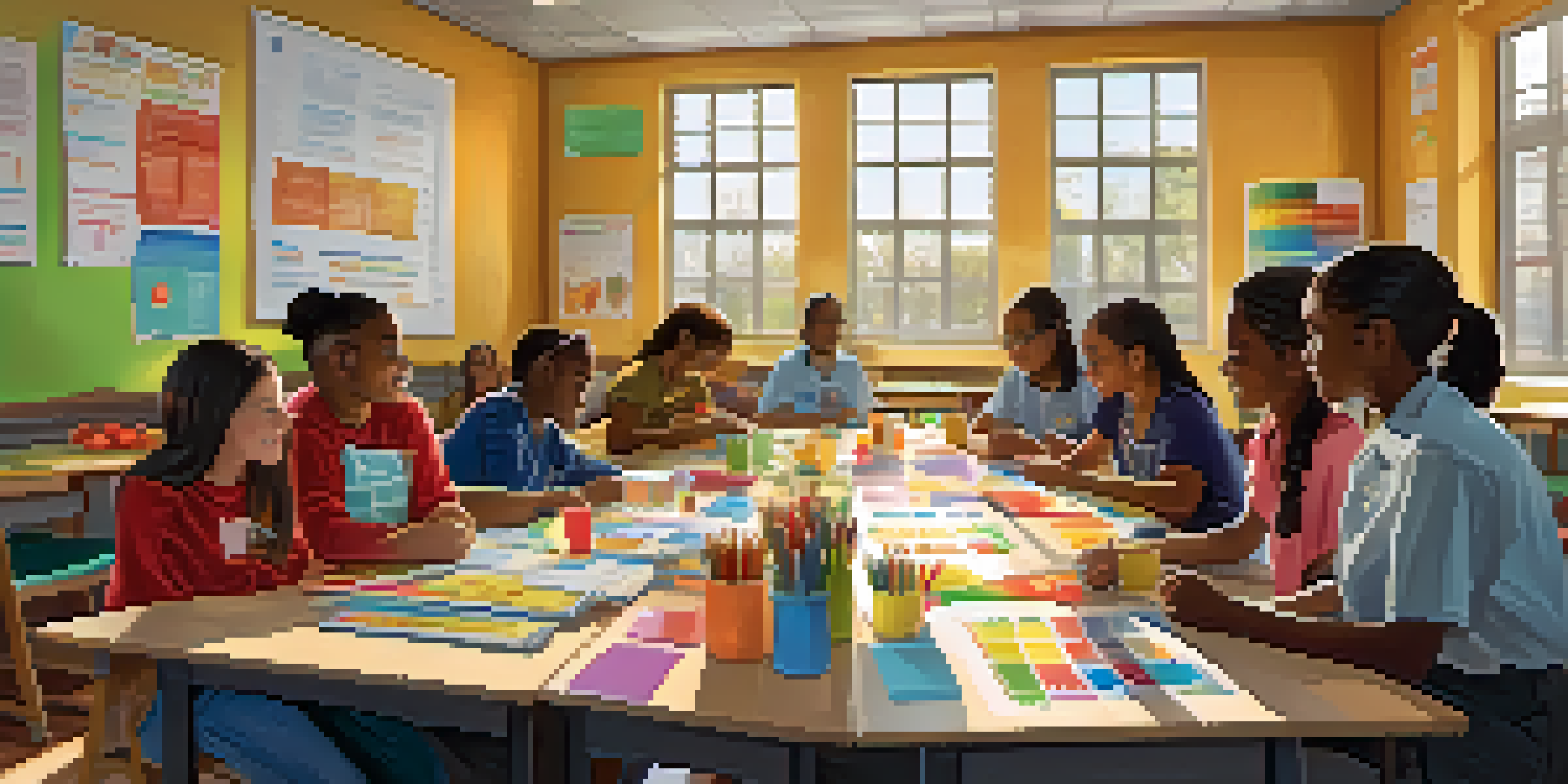Health Literacy in Schools: Curriculum Development Ideas

Understanding Health Literacy: A Crucial Foundation
Health literacy is more than just reading a nutrition label; it's about understanding how to make informed health decisions. In schools, this foundational skill empowers students to lead healthier lives. When students are equipped with the knowledge to navigate health information, they can better manage their well-being both now and in the future.
Health literacy is the degree to which individuals have the capacity to obtain, process, and understand basic health information and services needed to make appropriate health decisions.
Moreover, health literacy encompasses the ability to access, understand, and apply health information. This is essential in a world where misinformation can easily spread. By integrating health literacy into the curriculum, we set the stage for students to critically evaluate health messages they encounter in daily life.
Imagine students engaging in discussions about health topics that resonate with their lives, from nutrition to mental health. This engagement not only enhances their understanding but also encourages them to take ownership of their health journey. Ultimately, fostering health literacy in schools lays the groundwork for a healthier society.
Incorporating Health Topics into Core Subjects
One effective way to enhance health literacy is by weaving health topics into core subjects like science, math, and social studies. For instance, in science class, students can study the human body and its systems, while in math, they can analyze statistics related to health trends. This interdisciplinary approach makes health education more relatable and engaging.

In social studies, discussions about healthcare policies or historical public health campaigns can foster critical thinking. Students can debate the impact of these policies on different communities, which also ties into their understanding of equity and access in healthcare. This approach not only enhances health knowledge but also develops analytical skills.
Integrate Health Literacy in Schools
Embedding health topics into core subjects enhances students' understanding and makes health literacy a vital part of their education.
By integrating health topics into existing subjects, educators can ensure that health literacy is not seen as an isolated topic but rather a crucial component of overall education. This method helps students make connections between their learning and real-world applications, making the knowledge more impactful.
Utilizing Project-Based Learning for Engagement
Project-based learning (PBL) is a fantastic method to boost health literacy through hands-on experiences. Students can work on projects that require them to research health topics, design campaigns, or even create healthy meal plans. This active involvement fosters a deeper understanding of health concepts.
The greatest weapon against stress is our ability to choose one thought over another.
For example, students could collaborate to develop a community health initiative, providing them with practical experience in planning and executing a health campaign. This not only reinforces their learning but also instills a sense of responsibility towards their community. By seeing the real-world implications of their projects, students become more invested in health literacy.
Moreover, PBL encourages teamwork, communication, and problem-solving skills, which are essential in any field. As students engage in these projects, they learn to appreciate diverse perspectives and develop empathy, crucial qualities in promoting health within their communities.
Incorporating Technology to Enhance Learning
In our digital age, technology can play a pivotal role in enhancing health literacy. Interactive apps, online resources, and virtual simulations can make learning about health fun and engaging. For example, students can use apps to track their food intake or explore virtual environments that simulate health scenarios.
Online platforms also provide access to a wealth of information, allowing students to research health topics that interest them. This not only broadens their knowledge base but also helps them develop critical evaluation skills. Teaching students how to discern credible sources from unreliable ones is an essential component of health literacy.
Engage Community in Health Education
Involving parents and local organizations in health literacy initiatives creates a supportive network that reinforces learning at home.
Furthermore, incorporating technology into health education can cater to diverse learning styles. Visual learners might benefit from videos, while kinesthetic learners may enjoy interactive activities. By utilizing technology, educators can create a more inclusive and engaging learning environment.
Promoting Mental Health Awareness in Schools
Mental health is an essential aspect of overall health literacy that deserves attention in school curriculums. By incorporating mental health education, students can learn about emotional well-being, coping strategies, and the importance of seeking help. This knowledge is crucial, especially in a time when mental health issues among youth are on the rise.
Workshops, discussions, and activities centered around mental health can create a safe space for students to share their experiences and feelings. Encouraging open conversations about mental health reduces stigma and fosters a supportive school environment. Students can learn to recognize signs of distress in themselves and others, promoting a culture of empathy and understanding.
Moreover, integrating mental health education into the curriculum can empower students with tools to manage stress effectively. By teaching techniques such as mindfulness or self-care practices, we help students build resilience. This proactive approach to mental health literacy is vital for preparing students to navigate life's challenges.
Engaging Parents and the Community in Health Literacy
Involving parents and the community in health literacy initiatives can amplify the impact of school programs. Schools can host workshops or informational sessions that educate parents about health topics and resources. By equipping families with knowledge, we create a supportive network that reinforces students' learning at home.
Community partnerships can also enhance health literacy efforts. Collaborating with local health organizations or professionals can provide valuable resources and expertise. For instance, guest speakers from healthcare backgrounds can share insights, making health topics more relatable and applicable to students' lives.
Promote Mental Health Awareness
Incorporating mental health education in schools equips students with coping strategies and fosters a culture of empathy and understanding.
Furthermore, engaging the community fosters a sense of ownership and responsibility towards public health. When families and community members are involved in health literacy initiatives, it creates a collective effort to promote healthier lifestyles. This holistic approach not only benefits students but also contributes to the overall well-being of the community.
Evaluating and Adapting Health Literacy Programs
To ensure the effectiveness of health literacy programs, continuous evaluation and adaptation are essential. Schools should regularly assess the impact of their health education initiatives through surveys, feedback, and performance metrics. This process helps identify areas for improvement and success stories to build upon.
Incorporating student feedback is particularly valuable, as it provides insight into what resonates with learners. By understanding what methods or topics engage students, educators can refine their approaches to meet the evolving needs of their audience. Flexibility and responsiveness are key to maintaining relevance in health education.

Additionally, staying updated on current health trends and research allows educators to adapt their curriculums accordingly. As health issues change over time, so should the educational strategies used to address them. By prioritizing evaluation and adaptation, schools can ensure that their health literacy programs remain effective and impactful.